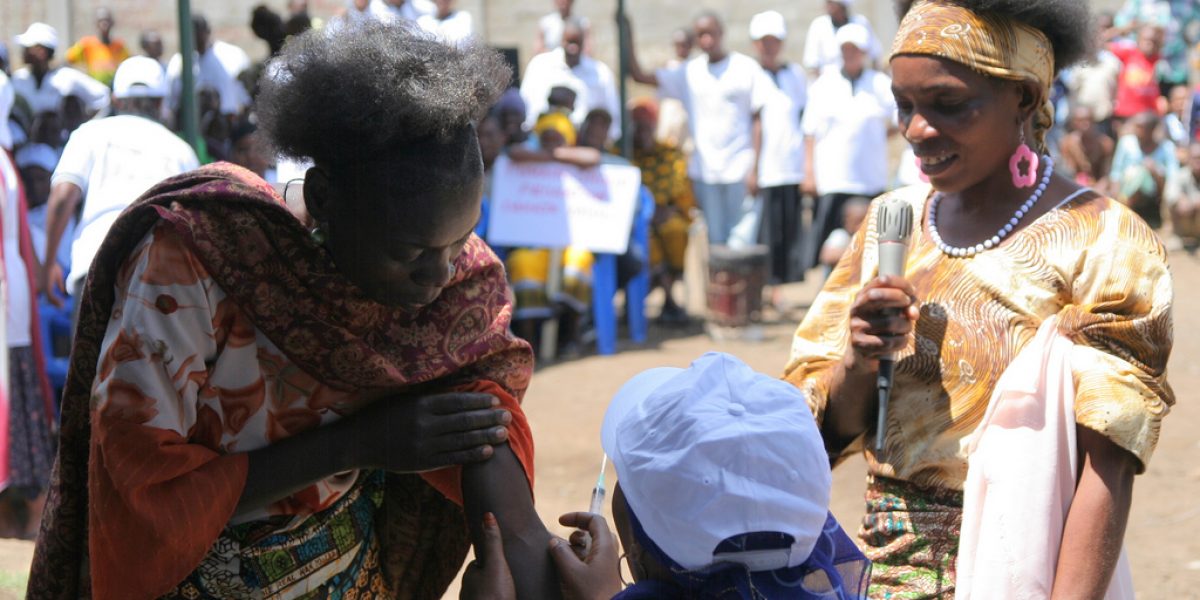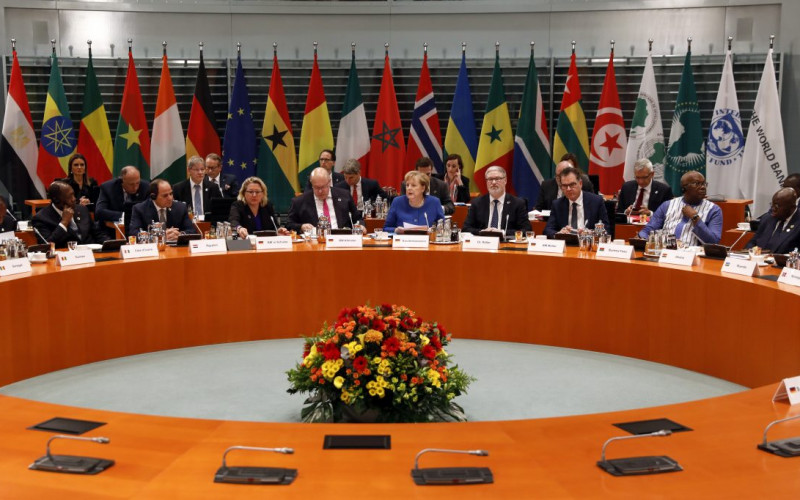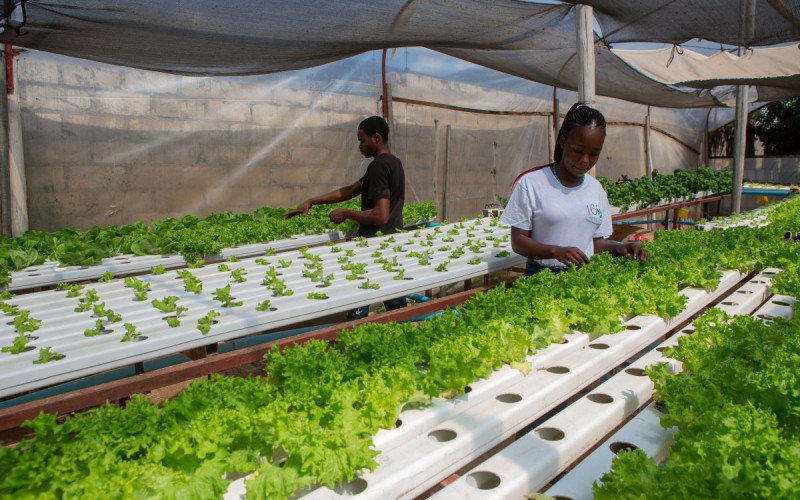But now, as international health organisations shift strategies in the battle against HIV and AIDS, getting married in Bukoba suddenly has international consequences. Tying the knot in rural Tanzania, as in many places in Africa where cultural traditions are still practiced, has always been serious business, involving a complex sequence of careful negotiations between the families of the couple where pride and reputation are critical concerns. Courting involves exchanges of bed sheets and machetes, cows and calabashes of home-brewed beer. Often, outside mediators are called in. One offensive cow or sour pot of brew can kill the deal and create lasting ill-will.
The diocese steps in
In 1983, Tanzania’s first case of AIDS was discovered in Bukoba, and within a few years, the village and the surrounding region became a land of widows, orphans and abandoned old people. Desperate for a solution, the local Catholic Diocese worked out a plan with village elders in the late 1980s to require all prospective brides and grooms to be tested for HIV twice – once before the marriage negotiations and again just before the wedding. If either side tests positive, the relationship is severed.
HIV testing is a complicated issue. Human rights advocates have long argued that, given the stigma attached to AIDS in societies all over the world, testing should be strictly voluntary and confidential. But that has done little either to encourage people to find out their status or slow the rate of infections, and as treatments become more available in developing countries, more states and international health organisations are starting to take a pro-active approach to testing.
The World Health Organisation and UNAIDS set out new guidelines in June recommending that health-care providers automatically offer HIV tests as part of any medical consultation. As more people find out their status, they argue, patterns of behaviour will change and stigma will lessen. Human rights activists aren’t so sure.
Bukoba provides ambiguous lessons. Infection rates have dropped since the region adopted mandatory testing for people seeking to marry, but for those who are found to be HIV positive, the stigma can be much worse.
The National AIDS Control Programme (NACP) of Tanzania announced recently that the village and the surrounding region no longer lead the country in infections and AIDS-related deaths. Consequently, ‘everyone is considering to go the Bukoba way because the testing-twice approach has worked effectively and with little pressure from authorities,’ said Muhingo Rweyemamu, an AIDS expert in Tanzania.
A tale of two sons
Edward Kashaija, a resident of nearby Mafumbo village, agrees. In 1989, his son, David, was due to be married. ‘His spouse was found positive a few weeks before marriage in 1989 on the second testing,’ Kashaija recalls. ‘Our entire family felt betrayed and we demanded back the bride price, which he later paid for another lady.’ If more places required pre-nuptial testing, he argues, fewer lives would be lost.
But another father, Ludovick Kashonje of a village named Rwanda, tells a sadder story. Five years ago his son, Kambona, tested positive before his wedding. ‘We found him dead in the garden,’ Kashonje says. ‘The bad thing about the testing exercise is that the entire process is never secret. Once the results are out, a positive partner suffers from serious stigmatisation. I suspect it was this that happened to my son.’ Kashonje thinks his son committed suicide.
The testing process in Bukoba involves the families of the partners, church leaders and hospitals. If the prospective bride and groom receive initial approval from their families to marry, they then consult a parish priest for an official endorsement for HIV testing at a hospital (to avoid misuse of the medical service, especially with infected parties).
The test results are sent in a sealed envelope back to the priest, who unveils them to the couple. If both parties test negative, the betrothal process, which normally lasts between six months and two years, proceeds. A second round of testing takes place just prior to the wedding. Again, both parties must test negative.
When one stumbles
Many prospective engagements have been derailed after the first testing. Most of the time, ‘it was men who were found HIV positive,’ says Juma Hamdani, a village chairman. ‘So the marriages are aborted and the ladies’ lives saved.’
Johannes Rweyemamu, a Roman Catholic priest at Rutabo village, concurs. ‘Very few ladies have caused cancellation of marriage arrangements. In most cases, whether at first or second testing, it has been men who were found positive,’ he says.
When a man is found positive, the woman withdraws and her family retains the bride price paid by the man’s family. If the woman is found positive, the man withdraws and his family imposes a deadline for the woman’s family to repay the bride price and any additional expenses already paid toward the betrothal.
Critics of the mandatory testing say the practice violates human rights. Geoffrey Ijumba, a lawyer working with the United Nations Children’s Fund in Dar es Salaam, believes that the involvement of priests and village elders infringes on people’s right to privacy. He argues that doctors alone should be allowed to disclose test results directly to their patients.
The new WHO and UNAIDS guidelines encourage medical practitioners to offer HIV tests as a part of routine health services, especially when patients exhibit symptoms typically associated with AIDS. Both organisations, however, stress the importance of confidentiality.
Even so, Marc Deru, a medical doctor with Partage Tanzania, a non-governmental organisation providing health services in the region, rejects the change in approach. He argues that ‘pursuing testing is unreasonable and even harmful. It is unjustifiable on either a scientific or medical basis. The only reasonable attitude to take is to return to the simplicity and objectivity of clinical practice, to the diagnosis and treatment of clinically visible illnesses.’
One problem with testing is that the virus can incubate for months without detection, making the Bukoba approach questionable.
But village elders and local priests argued that something had to be done. NACP figures showed that the Bukoba region had 800,000 HIV-positive patients by 1992, just nine years after the first case was discovered. Annual deaths were reported at between 20,000 and 30,000. The region accounted for 80% of all HIV infections countrywide, according to the Tanzania Assessment and Planning Study, which was sponsored by the World Bank in 1992.
The impact is measurable today. By 2002, 33% of all school pupils in the region were orphans, said Titus Kamwamwa, co-ordinator for the Kagera Zone Aids Control Programme.
Father Rweyemamu resists calling the double-testing policy mandatory. Everyone saw the wisdom in it, he says: ‘Without testing, there would be few people left.’
Changes in behaviour
Deru admits an obvious improvement: ‘A ghost town in 1988, Bukoba is now a lively and busy place. The spectre of a deadly epidemic has receded and the region is no longer referred to as the “epicentre of AIDS in Africa.”‘
A study by the Kagera AIDS Research Project on the impact of marriage testing suggests significant changes in sexual behaviour away from activities considered to increase the risk of infection. It cites an increase in condom use, abstinence, monogamy and voluntary HIV testing.
The decline in infections in Bukoba and other nearby villages has inspired other regions to try the approach. The Mennonite Church in Mbeya region in Southern Tanzania has already announced plans to emulate the Bukoba experience. Seventh Day Adventists and Muslims have also backed the approach.
‘We are not copying religion, but reasonable and viable approaches in the fight against AIDS, which President Benjamin Mkapa has declared a national calamity,’ says Moses Byarugaba, a Seventh Day Adventist pastor.








